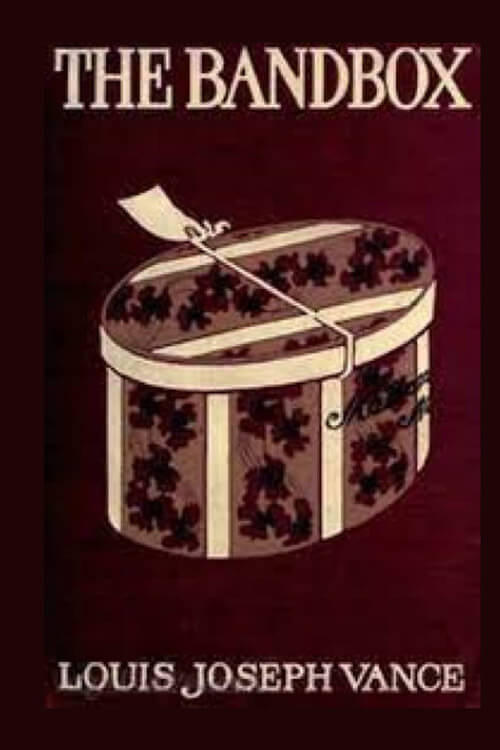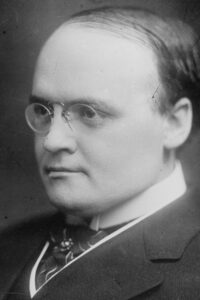
The Bandbox
At half-past two of a sunny, sultry afternoon late in August, Mr. Benjamin Staff sat at a table in the dining room of the Authors’ Club, moodily munching a morsel of cheese and a segment of cast-iron biscuit and wondering what he must do to be saved from the death-in-life of sheer boredom.
A long, lank gentleman, surprisingly thin, of a slightly saturnine cast, he was not only unhappy, he looked it. He was alone and lonely; he was an American and a man of sentiment (though he didn’t look that), and he wanted to go home. To sum up, he found himself in love and London at the same time and felt precisely as ill at ease in the one as in the other of these, to him, exotic circumstances.
Inconceivable as it may seem that any rational man should yearn for New York in August, that and nothing less was what Staff wanted with all his heart. He wanted to go home and swelter and be conned by taxicab drivers and snubbed by imported head-waiters; he tried to patronize the subway at peril of asphyxiation and to walk down Fifth Avenue at that witching hour when electric globes begin to dot the dusk of evening—pale moons of a world of steel and stone; he wanted to ride in elevators instead of lifts, in trolley-cars instead of trams; he wanted to go to a ball-game at the Polo Grounds, to dine dressed as he pleased, to insult his intelligence with a roof-garden show if he felt so disposed, and to see for himself just how much of Town had been torn down in the two months of his exile and what they were going to put up in its place. He wanted, in short, his people; more specifically, he wanted just one of them, meaning to marry her if she’d have him.
Now, to be homesick and lovesick all at once is a tremendously disturbing state of affairs. So influenced the most muscular men are prone to folly. Staff, for instance, had excellent reason to doubt the advisability of leaving London just then, with an unfinished play on his hands, but he was really no more than a mere, normal human being, and he did want very badly to go home. If it was a sharp struggle, it was a short one that prefaced his decision.
Of a sudden, he rose, called for his bill and paid it, called for his hat and stick, got them, and resolutely—yet with a furtive air, as one who would throw a dogging conscience off the scent—fled the premises of his club, shaping a course through Whitehall and Charing Cross to Cockspur Street, where, with the unerring instinct of a homing pigeon, he dodged hastily into the booking office of a steamship company.
Read or download Book
Louis Joseph Vance
Louis Joseph Vance (September 19, 1879 – December 16, 1933) was an American novelist, screenwriter and film producer. He created the popular character Michael Lanyard, a criminal-turned-detective known as The Lone Wolf.
Biography
Louis Joseph Vance was born September 19, 1879, in Washington, D. C., the only child of Wilson J. Vance, a Medal of Honor recipient, and Lillian Beall. He was educated at the Brooklyn Polytechnic Institute. Vance was married to Anne Elizabeth Hodges on February 19, 1898. Their son, Wilson Beall Vance, was born in 1900.
He wrote short stories and verses after 1901 and then composed many popular novels. His character Michael Lanyard, known as The Lone Wolf, was featured in eight books and 24 films between 1914 and 1949 and also appeared in radio and television series.
Vance moved to Los Angeles to work with Universal Pictures on films based on his work, including The Trey o’ Hearts (1914) and a serial and film series (1914–1916) based on his Terence O’Rourke stories. In 1915, he founded Fiction Pictures, Inc., a motion picture production company whose films were distributed by Paramount Pictures. Its first release was The Spanish Jade (1915), with a screenplay by Vance based on his stage adaptation of a novel by Maurice Hewlett. Vance was president and general manager of the company; other principals were Wilfred Lucas (director-general), Gilbert Warrenton (cinematographer), and Bess Meredyth (scenario editor). Fiction Pictures operated in Glendale until a new studio in Hollywood was completed in April 1915. The studio was sold to Famous Players in June when Fiction Pictures went out of business.
Vance died alone in his New York City apartment on December 16, 1933, in a fire that resulted from his falling asleep with a lighted cigarette. His death was ruled accidental. A simple funeral took place December 20, 1933, at St. George’s Protestant Episcopal Church in Brooklyn, with honorary pallbearers including Marc Connelly, Will Irwin, and Samuel Merwin.[5] Vance’s widow received an estate of less than $10,000.






